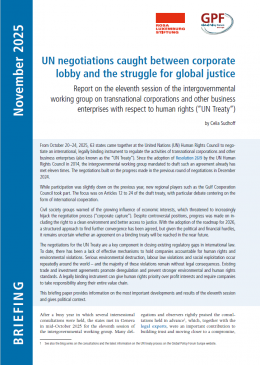From October 20–24, 2025, 63 states came together at the United Nations (UN) Human Rights Council to negotiate an international, legally binding instrument to regulate the activities of transnational corporations and other business enterprises (also known as the “UN Treaty”). Since the adoption of Resolution 26/9 by the UN Human Rights Council in 2014, the intergovernmental working group mandated to draft such an agreement already has met eleven times.
The negotiations built on the progress made in the previous round of negotiations in December 2024 and are a key component in closing existing regulatory gaps in international law. To date, there has been a lack of effective mechanisms to hold companies accountable for human rights and environmental violations. Serious environmental destruction, labour law violations and social exploitation occur repeatedly around the world – and the majority of these violations remain without legal consequences. Existing trade and investment agreements promote deregulation and prevent stronger environmental and human rights standards. A legally binding instrument can give human rights priority over profit interests and require companies to take responsibility along their entire value chain.
This briefing paper provides information on the key developments and results of the eleventh session and places them in political context.

